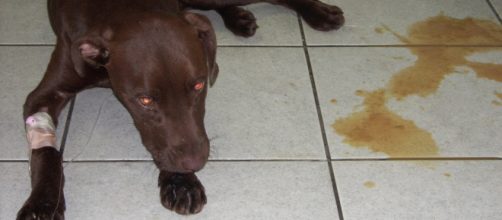Canine Parvovirus is the leading viral cause of enteritis in dogs, according to a case study in Cebu, Philippines. It is common to find a number of cases in veterinary clinics because the Viral Infection is highly contagious and your dog can pick up the Disease by direct contact with infected dogs. The virus is concentrated in the fecal material, so contact with it, either direct or indirect can lead to an infection. The disease can manifest itself in two forms; intestinal and cardiac. The most common form is the intestinal form of parvoviral infection which commonly affects dogs from 6 weeks to 6 months of age.
When do you suspect that your dog is infected?
According to PetMD, the main signs of intestinal parvovirus can be similar to parasite infestation or even salmonella. It is best to check with your veterinarian so they can test for parvovirus which can be fatal. These symptoms include;
- vomiting
- severe, bloody, mucoid diarrhea
- lethargy
- anorexia
- dehydration
- fever
- increased heart rate
- abdominal discomfort
If you observe bloody diarrhea accompanied with some or all of the signs mentioned above, you should take your dog to your local veterinarian. Never attempt to treat your dogs with human medication as it could worsen its condition. The right medicine and proper care should be given to increase the likelihood of your dog surviving the infection.
How can your dog avoid parvoviral infections?
Vaccinations are readily available in veterinary clinics. However, one shot of vaccine is not enough to protect your dog from the disease. As vaccinations go, you should have a series of shots within a certain time interval. This will be determined by your veterinarian "depending on the breed of your dog or the prevalence of the disease in your area," says Pat Storer in his book "Your Puppy, Your Dog: A Kid's Guide to Raising a Happy, Healthy Dog,"
However, having your dog vaccinated does not guarantee that they will not get the disease. Vaccination failure, a weak immune response, and a virulent strain of the virus could all contribute to infection.
Your dog is still at risk of contracting the disease as long as the vaccination protocol is not yet complete. Therefore, try not to let your dog interact with unfamiliar or unvaccinated dogs or bring them outside for a stroll.
Can infected dogs survive?
70 percent of dogs infected with parvovirus can survive the disease if the owner takes them to the veterinarian immediately. Healthy Pets writes, "Treatment of an infected dog consists of immediate delivery of supportive care, including replacing fluids and electrolytes, controlling vomiting and diarrhea, and preventing secondary infections. Since the disease is so contagious, affected dogs should be isolated to minimize the spread of infection."
This is why most veterinarians would approach the disease in a manner where supportive treatment is given. Pain, discomfort, dehydration, and lack of nutrients are the primary concerns of your veterinarian when it comes to parvovirus.
If you want your dog to survive, never try to treat your dog yourself.


